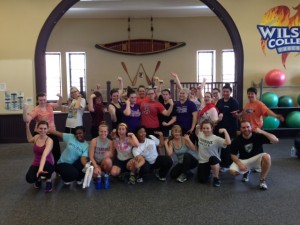Students Challenged by Spartan-Style Training
Victoria Whitbred ’14 wakes up every Wednesday morning feeling like a Spartan. She knows that at 12:30 p.m. on that day she will push herself to her physical and mental limits and conquer her body’s weaknesses. Just as the citizens of Laconia (Sparta) did in ancient Greece, Victoria strives for excellence — both of the body and of the mind.

Photo by Leigh Cordell
Laconophilia is a term that refers to our modern day fascination with the Spartan philosophy of “excellence.” Spartans believed the military to be a model for individual and social strength.
Whitbred is not alone in her efforts to adapt this way of thinking into her busy lifestyle . She shares her goal with the other participants of the weekly Spartan-style exercise class instructed by Leigh Cordell, who is a former Wilson student and currently certified Spartan X personal trainer. The class was created and is designed after Cordell’s 2011 experience competing in the National Spartan Race.
Cordell recalls, “I was in the Spartan Race and I fell in love. It was like returning to our roots of playing hard and having a good time, while really working hard.”
Whitfeld agrees. “It is fun, but it is intense. I work out every day and since it’s a new station every few seconds, the workout changes constantly. After the first class I had to take a few days off.”
Cordell structures her fitness class in a boot camp-like, militaristic manner. Her trainees attack flabby muscles and belly fat with a three-phase system of approah. Phase one is about function.
“This is all about using the body’s own weight to teach natural resistance and for everyone to learn how to use their own body to exercise,” says Cordell.
Phase two focuses on fitness. Weights and other equipment, such as a medicine ball, are introduced into the workout.
Phase three is the climactic final stage, where emphasis is put on developing strength and power.
“During this phase we use nontraditional weights and repetitions with no resting between the intervals,” says Cordell.
Nontraditional conditioning and techniques require the body to move athletically. The result is greater coordination and muscle control.
In addition to the intensity of the workout, the comradely bonds that form between participants help to keep the Spartan style of exercising popular. Professor of Environmental Studies Ed Wells identifies this aspect of the program as a key to its success. Wells competed in the Spartan Race in mid-July of 2014. After ten years of working out he was bored of his normal routine of lifting weights and found the Spartan workout re-invigorating. His team, Team Franklin County, placed in the race in the top one percent of finishers.
“Although we were proud of our times, it is more about challenging yourself in a supportive community. When you want to quit or don’t think that you can go on, somebody is there to cheer you on,” says Wells.
The Spartan class currently meets every Wednesday in the Fitness Center at 12:30 p.m. Other class times may be added and will be announced when available. Participants of the class are encouraged to compete in the Spartan Race, but are not obligated. For more information contact Lori Frey at lori.frey@wilson.edu.
